Chrome OS
Latest
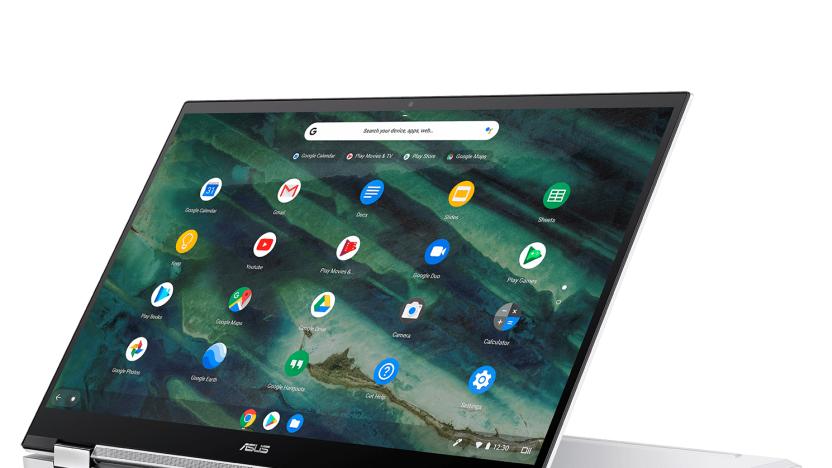
The next ASUS Chromebook Flip will use Intel's 10th-generation processors
For the past few years, the ASUS Chromebook Flip have been the Chromebook I'd recommend most people buy. It hasn't even been a year since ASUS released the Chromebook Flip C434, but they're back at it again with the C436. We don't yet know how much it'll cost, but ASUS's track record at making compelling Chromebooks means we'll be on the lookout for this one.

Google Cloud Print follows Reader and Inbox to the trash heap after 2020
If there's anything Google loves as much as launching interesting new projects (say hello to Stadia and Duplex on the web!), it's killing them off after a few years, and now we have an end date for Google Cloud Print. The service launched in 2010 as a way to make printers more accessible for Chrome OS, but 9to5Google points out a post on the support site that indicates its services are no longer needed. Google correctly notes that it has improved native printer support on Chrome OS, but Cloud Print has been a welcome link from all kinds of devices to the printers we know, love and are endlessly frustrated by when they refuse to work. Its easy link to other services came through in the clutch more than once, but now we're headed back to one-by-one setups and disparate printing apps. If you've come to rely on the service, then you have until the end of 2020 to work out an alternative, because when the lights come on in 2021 -- "devices across all operating systems will no longer be able to print using Google Cloud Print." Cloud Print never even made it out of beta status.
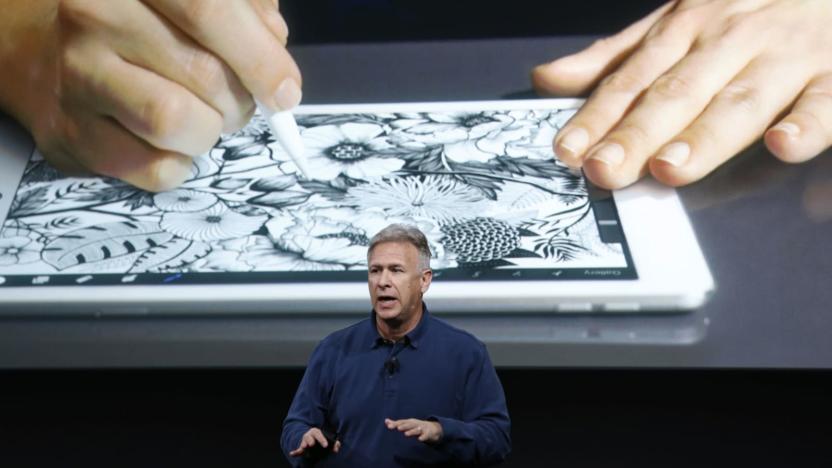
Apple's Phil Schiller says Chromebooks won't help kids succeed (updated)
Apple's focus might be on its high-end 16-inch MacBook Pro at the moment, but marketing chief Phil Schiller has also chipped in on the lower end of the market -- namely, how he thinks it might affect students. The executive told CNET in an interview that students using Chromebooks are "not going to succeed" in schools due to the systems' limited abilities. The laptops are "cheap testing tools for required testing" that don't properly inspire students, Schiller said. To no one's surprise, he believed the iPad was the "ultimate tool" for K-12 students due to its ability to keep children engaged as well as tools like Swift Playgrounds. "You need to have these cutting-edge tools to help kids really achieve their best results," the exec said.
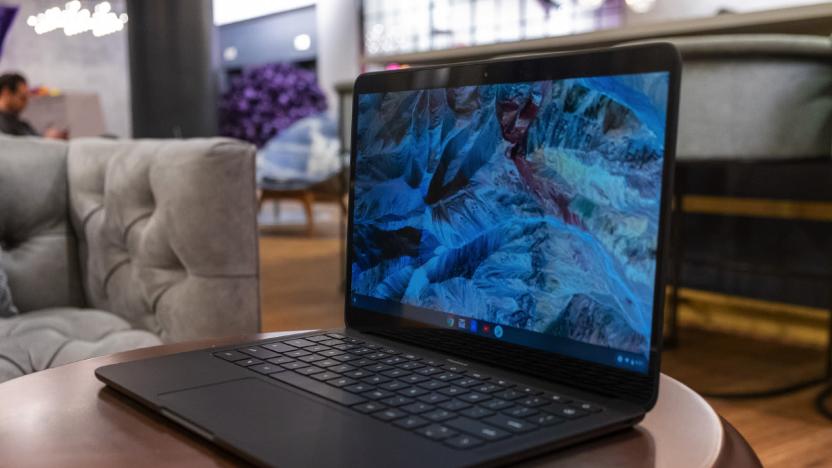
Chrome OS officially supports virtual workspaces now
Chrome OS just became more useful if you rely on it for getting work done. Google is rolling out a Chrome OS 78 update that more formally introduces the virtual desktop support seen in August. Anyone can create "Virtual Desks" that organize app and window layouts as separate spaces. You could have an all-business desktop for when you're trying to finish a report, and a leisure desktop when you want to watch videos and catch up with friends. You only have to open Overview and hit New Desk to create a space.
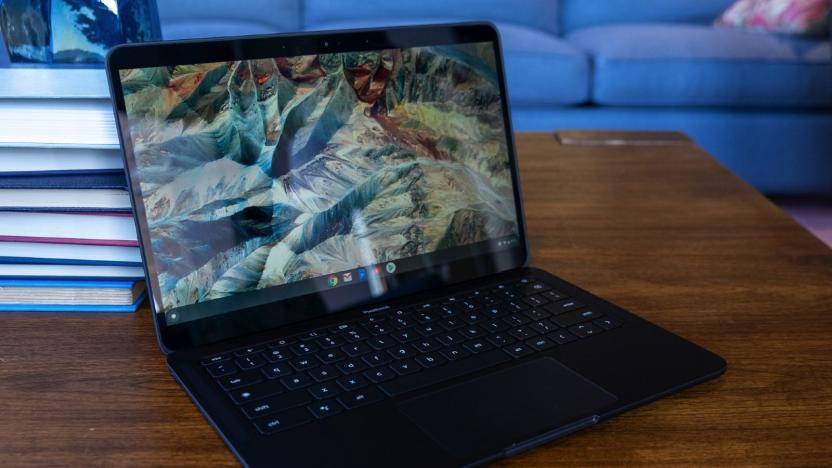
Google Pixelbook Go review: Function over form
Google has been building its own Chromebooks for a while now -- first, there were two iterations of the Chromebook Pixel, and then there was 2017's Pixelbook. All three were great laptops with one glaring flaw: They cost way too much money. We're talking $1,000 or more, at a time when most Chromebooks were $500 or less. Google is back at it this year with the new Pixelbook Go -- but for the first time, the company is no longer aiming for absolute quality regardless of price, just to prove a point. Instead, Google is trying to build a Chromebook that anyone can use and afford: The Pixelbook Go starts at $649, a full $350 less than the original Pixelbook. It's still a lot of money for a Chromebook. But there are plenty of other manufacturers building premium Chromebooks in that price range now. The Pixelbook Go certainly can hold its own against just about any other Chromebook out there. But unfortunately, in its quest to get the price down, Google also sacrificed a lot of what made the original Pixelbook so intriguing in the first place. The question is whether those trade-offs are worth it.
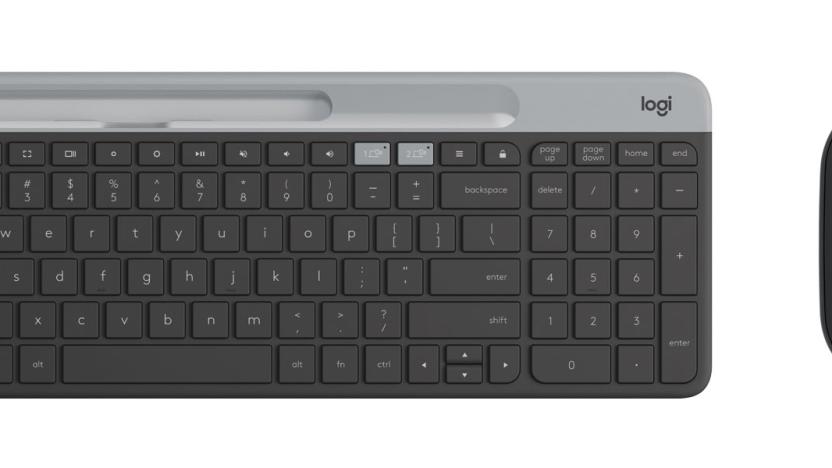
Logitech unveils its first mouse and keyboard built for Chrome OS (updated)
Now that the Pixelbook Go is here, you might want a mouse and keyboard to go with it. Logitech, unsurprisingly, is happy to oblige -- the company has unveiled its first Made for Google devices, the M355 Portable Wireless Mouse (not shown to scale) and K580 Slim Multi-Device Wireless Keyboard, Chrome OS Edition. The K580 is the highlight, packing both a row of Chrome OS shortcut keys as well as a dedicated Google Assistant key for your voice queries. You'll also find a built-in cradle to rest your Pixel phone (or any phone, really) while you're getting work done, and a button lets you switch between three two different devices if you like to bring your keyboard around. A maximum three-year (!) battery life guarantees that you won't be swapping cells very often.

Pixelbook Go hands-on: Google’s affordable premium Chromebook
Google's Pixel laptops used to be synonymous with "expensive." With prices upwards of $1,000, the company's Chromebook Pixel and Pixelbook were costly products meant only for the most ardent Chrome OS fans. Paradoxically, they were launched at a time when most people associated Chromebooks with cheap, secondary laptops -- you'd have had a hard time finding a third-party option that cost more than $350. But now that premium Chromebooks are popping up and Chrome OS is starting to make its way into workplaces, it seems people are ready for a Pixelbook for the masses. The Pixelbook Go, which the company unveiled today, could be just that. It may be more expensive than the competition, but it's not just another exorbitant shell for Chrome OS.
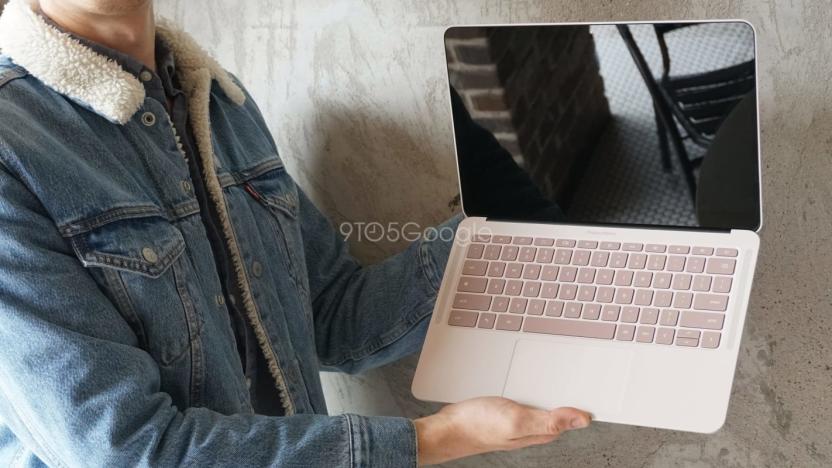
Pixelbook Go leak reveals its ribbed back, full specs
A month after exposing Google's next laptop as the Pixelbook Go, 9to5Google has extensive pictures and even a hands-on video with the device. The pictures show off a prototype laptop -- held by a person wearing the "Jacquard by Google" Levi's jacket -- in a "Not Pink" colorway, with its lid that has a smooth finish similar to some Pixel phones, and its oddly textured underside that's even more deeply colored -- all the better to show off its standout ribs. The keyboard is similar to the earlier Pixelbook model, while its front-facing speakers are apparently capable of quality sound output. There are USB-C ports on each side each with a charging light and one 3.5mm headphone jack to the left -- it's not dead yet. The design isn't far off from Apple's laptops, but if Google is trying to show what a standard-bearer Chrome OS machine can be then this looks like a good attempt.
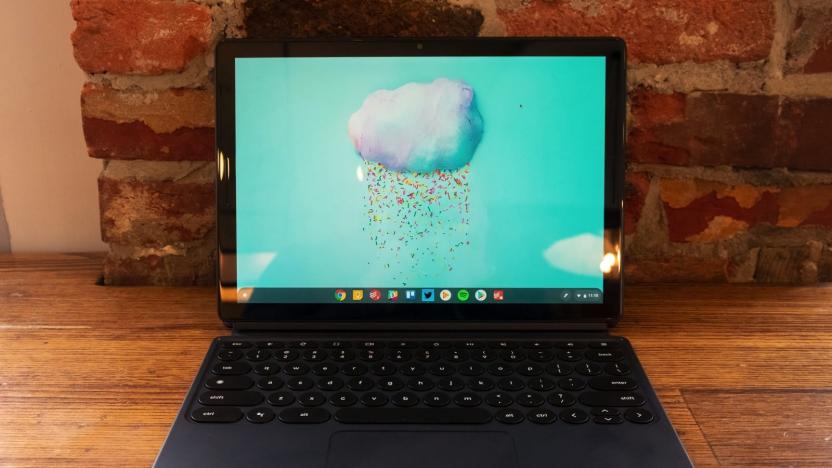
If you're feeling brave, the Pixel Slate and keyboard are on sale for $549
When we point our readers to deals here at Engadget, it's almost always for products we have personal experience with and would recommend based on that experience. This one is... a little different. Last fall, I reviewed Google's Pixel Slate and found it had excellent hardware with software that was lacking on a number of fronts. It was also far too expensive to recommend given those faults. But what if it cost just half of what Google was asking? I'd probably have a different take on things.

Google's rumored Pixelbook Go laptop may pack a 4K display
Despite doubts, that rumored Pixelbook successor appears to be a Google-made device -- but it might also represent a rare return to basics. Sources for 9to5Google say the new Chrome OS device, now believed to be called the Pixelbook Go, will be a relatively plain 13.3-inch touchscreen laptop -- not a convertible, not a tablet. It would stand out primarily through conventional upgrades, including at least one that's rare on Chromebooks.

Google and Dell team up on the first Chromebooks made for business
The next time you get a laptop from your company's IT department, you might be getting a Chromebook. Not that you couldn't already get a Chromebook from your office, but these offer extra security and organizational features that might leave IT professionals more reassured. The Dell Latitude 5400 Chromebook Enterprise and Dell Latitude 5300 2-in-1 Chromebook Enterprise were born from a partnership between Dell and Google, though the latter also has some updates around Chrome OS enterprise to share today. Unwieldy names aside, these new machines are based on existing models of Dell's Latitude laptops, except they run Chrome OS. So don't be surprised if you find them familiar.
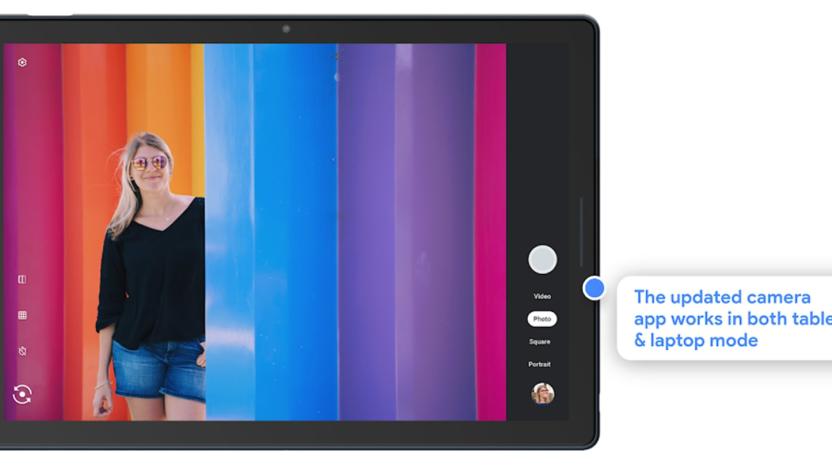
Google is making it easier to shoot proper portraits on Chromebooks
For all the odd souls out there who love taking photos with their tablets, Google's latest Chrome OS update is a big one. In addition to adding centralized music controls and support for virtual desktops, Chrome OS 76 adds a new portrait mode to the platform's camera app, the company revealed on Thursday.
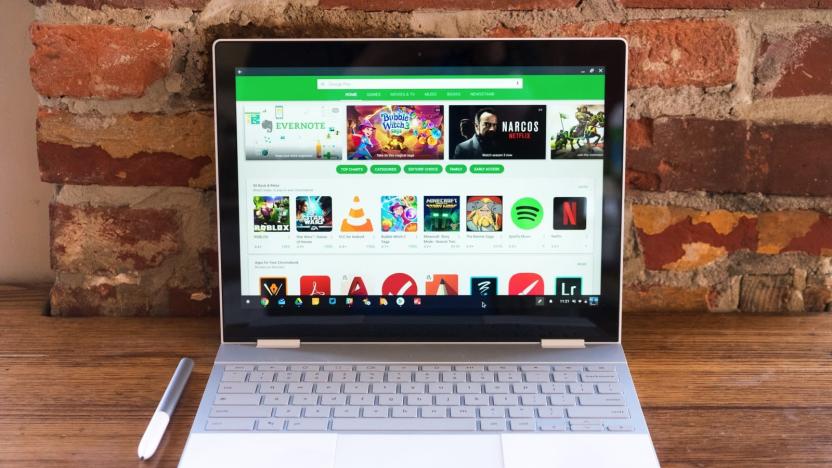
Chrome OS finally supports virtual desktops
Chrome OS is adding a mainstay feature that other computer platforms have had for years: virtual desktops. The newly released Chrome OS 76 supports "Virtual Desks" that, like elsewhere, lets you create app layouts you can switch to in a heartbeat. You could have a writing-focused space that revolves around Google Docs, for example, and another space that helps you keep up on your social networks.

Google getting out of the tablet game was inevitable (and smart)
Yesterday afternoon, Google's hardware division made an unusually forthcoming announcement: The company will no longer build its own tablets. Instead, it will focus all of its efforts on laptops. Given that Google released the Pixel Slate (its first Chrome OS tablet) just eight months ago, the news was a bit surprising. But if you've paid attention to Google's checkered history with tablets, it's hard to see this move as anything but logical, particularly when you consider the undeniable success Chromebooks have had lately, particularly in education.
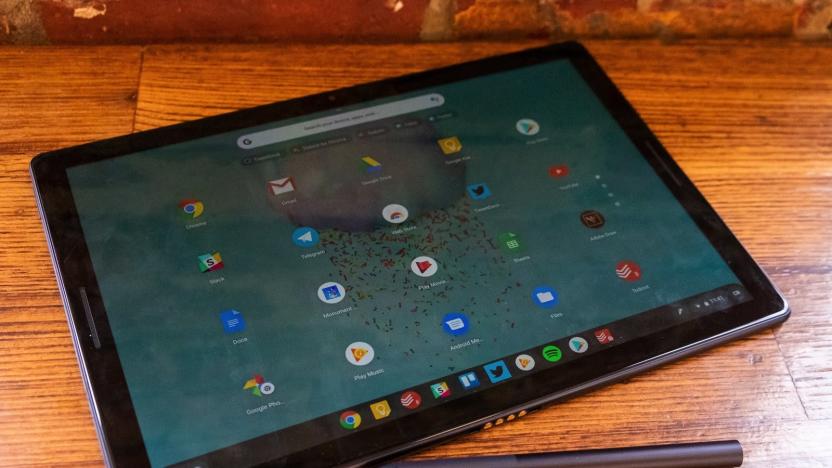
Google has made its last tablet
If you're someone who saw the potential in the Pixel Slate, despite its software issues, we have some bad news. Google is no longer planning to make any tablet hardware going forward and will put all its resources behind laptops in the future. In a statement received by Engadget, a Google spokesperson said that "for Google's first-party hardware efforts, we'll be focusing on Chrome OS laptops and will continue to support Pixel Slate." Google's spokesperson also noted that the company will continue working with third-party hardware makers on Chrome OS for both laptops and tablets. This news came first from JR Raphael at Computerworld, who writes that Google had two smaller tablets in the works, both of which have been cancelled. Going along with that, internal resources are being re-allocated to work on laptop hardware going forward.

This week in tech history: Google unveils the first consumer Chromebooks
At Engadget, we spend every day looking at how technology will shape the future. But it's also important to look back at how far we've come. That's what This Week in Tech History does. Join us every weekend for a recap of historical tech news, anniversaries and advances from the recent and not-so-recent past. This week, we're looking at Google's 2011 I/O event, where it announced the first two Chromebooks that would go on sale later in the year.

Google is making it easier to build Android apps on a Chromebook
At I/O last year, Google announced it was adding Linux support to Chrome OS, a move that made it a lot easier for web and Android developers to use Chromebooks. One year later, the company says that more than half of all Chromebooks now work with Linux, and all new devices released this year will support Linux as well. And today, Google has a handful of developer-focused updates that'll make building Android apps on Chrome OS a good bit easier.
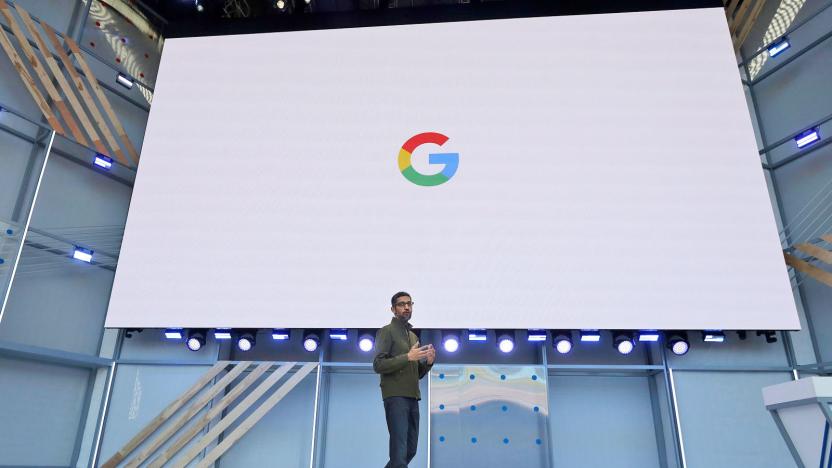
How to watch Google's opening I/O 2019 keynote at 1PM ET
This year's Google I/O keynote promises to be a special one. For the first time in a long while, Google has confirmed there will be new hardware -- new Pixel phones are virtually certain, while a Nest smart display could also be in the cards. And that's not including the usual news about AI, Chrome and the seemingly inevitable surprises each year. Thankfully, you don't have to miss a minute of it. Google is livestreaming the keynote both below and on its I/O event page starting at 1PM Eastern. And if you can't watch or just want to stay one step ahead of the action, you can tune into our liveblog to follow the developer conference as it unfolds.

What to expect at Google I/O 2019
May has begun, and that means the latest iteration of Google's I/O developer conference is right around the bend. Usually, that translates to a deluge of new software, AI breakthroughs and web technology. And we're still expecting plenty of that at this year's show. This time around, however, there's a bit of a twist: Google confirmed during its latest financial results call that it will make hardware announcements at I/O, breaking a device drought from the past few years. But what does it plan to reveal, exactly? Here's a primer on what to expect so that you're prepared for whatever appears onstage on May 7th.

Chrome OS unifies Google Assistant and device searches
You don't have to be quite so picky when you start a search on your Chromebook. Google has released Chrome OS 74, whose cornerstone is a reworked search experience that unifies Google Assistant, on-device and web search. Tap the search box and you just have to enter whatever you're looking for, whether it's an app or tomorrow's forecast. Suffice it to say this could be less confusing if you're a newcomer, or just don't want to switch search methods.




